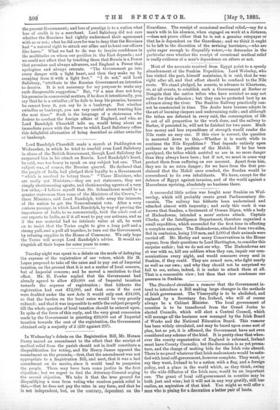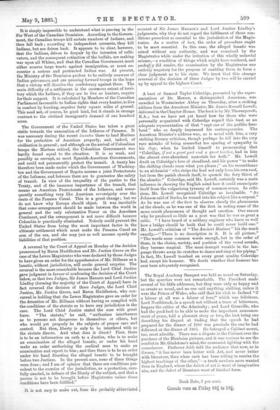A successful little action was fought near Suakim on Wednesdai,
which will probably create great Parliamentary discussion. The railway has hitherto been undermined, and attacked almost with impunity ; and early this week it was known that Saadun, a lieutenant of Osman Digna, with a body of Hadendowas, intended a more' serious attack. Captain Clarke, of the Intelligence Department, therefore organised a small expedition, which succeeded for the first time in effecting a complete surprise. The Hadendowas, attacked from two sides, fled in confusion, losing 150 men, and 2,000 of their animals were carried off. Mr. Morley and many Conservatives in the House appear, from their questions to Lord Hartington, to consider this surprise unfair ; but we do not see why. The Hadendowas are at war with us, kill our soldiers when they can, impair our communications every night, and would massacre every soul in Suakim, if they could. They are armed men, who fight nearly as well as our own; and why they should not be surprised we fail to see, unless, indeed, it is unfair to attack them at all. That is a reasonable 'view; but then that view condemns our presence in Suakim.
The Standard circulates a rumour that the Government intend to introduce a Bill making large changes in the methods of Irish government. The Viceroyalty is to be abolished, and replaced by a Secretary for. Ireland, who will of course always be a Cabinet Minister. The local government of counties is to be transferred from the Grand Juries to elected Councils, which will elect a Central Council, which will manage all the business now managed by the Irish Board of Works and the National Education Board. This rumour has been widely circulated, and may be based upon some sort of plan, but as yet, it is affirmed, the Government have not even considered any scheme of the kind. It is pretty clear that whenever the county organisation of England is reformed, Ireland must have County Councils ; but the discussion is as yet premature, and the charge of making bids for the Irish vote absurd. There in no proof whatever that Irish malcontents would be satisfied with local self-government, however complete. They want, or say they want, Ireland to be a nation with a flag, and a foreign policy, and a place in the world which, as they think, owing to the wide diffusion of the Irish race, would be an important one. The grant of local self-government in counties may be both just and wise; but it will not in any way gratify, still less realise, an aspiration of that kind. You might as well offer a man who is pining for a decoration a better pair of boots. It is simply impossible to understand what is passing in the Far West of the Canadian Dominion. According to the Government, the Canadian troops kill certain numbers of Indians, and then fall back ; according to independent accounts, they kill Indians, but are driven back. It appears to be clear, however, that the Indians, driven to despair by the intrusion of cultivators, and the consequent extinction of the buffalo, are making war upon all Whites, and that the Canadian Government must either reserve large tracts against immigration, or must encounter a serious and protracted Indian war. At present, the Ministry of the Dominion profess to be entirely unaware of Indian grievances-, and are pressing forward troops in the hope that a victory will dissolve the confederacy against them. The main difficulty of a settlement is the enormous extent of territory which the Indians, if they are to live as hunters, require for their support. It is calculated by Members of the Canadian Parliament favourable to Indian rights that every hunter, to live in comfort by hunting, requires forty square miles of ground. This need not, of course, be good land, but it stands in strange contrast to the civilised immigrant's demand of one hundred acres.



































 Previous page
Previous page